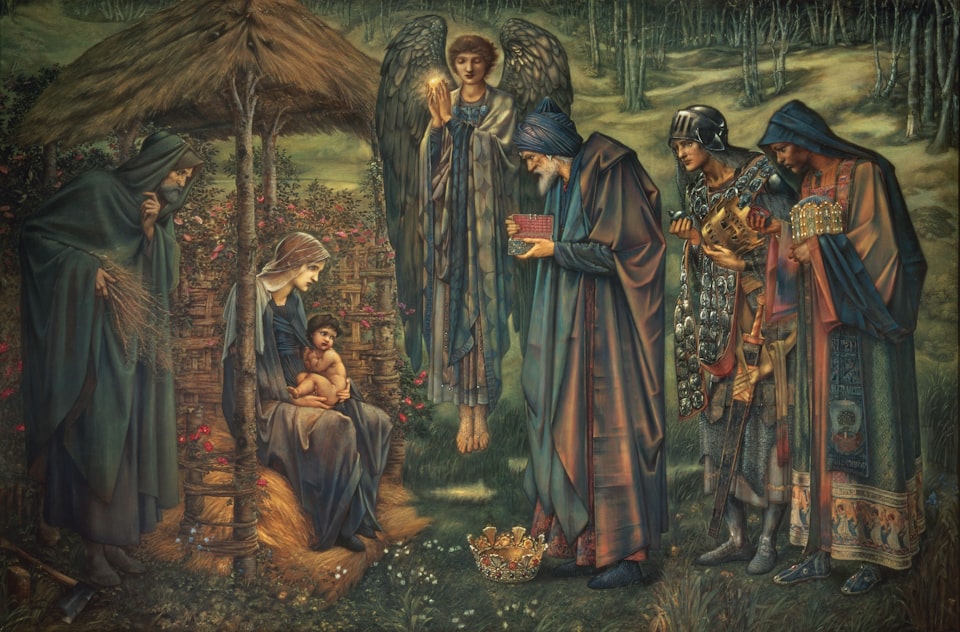Not A One-Note Holiday

Over the past three weeks, our church has been exploring the themes of Advent: Hope, Peace, Love, Joy. December is one of the few times in American culture where we bend nearly every aspect of our society towards a season of delight and cheer: music, decor, food, and clothing all seem a bit more festive. As Christians, we celebrate the coming of Jesus, God-in-the-flesh, and look forward to Jesus’ return to set the world to rights.
But Advent and Christmas have never been simple, one-note holidays, marked merely by cheer, fun, and whatever boughs of holly are. The famous stories of Matthew and Luke are each tinged with melancholy of one sort or another. An old couple having a child late in life. An unwed mother crashing at her cousin's pad. An engaged man considering breaking it all off.
Matthew is even willing to admit that Jesus' birth inadvertently causes harm to others. In Matthew 2, the evangelist reports the tragic reaction of King Herod to the birth of Jesus.
When Herod saw that he had been tricked by the magi, he was infuriated, and he sent and killed all the children in and around Bethlehem who were two years old or under, according to the time that he had learned from the magi.
Then what had been spoken through the prophet Jeremiah was fulfilled:
“A voice was heard in Ramah,
wailing and loud lamentation,
Rachel weeping for her children;
she refused to be consoled, because they are no more.”
Some Biblical scholars have cast doubt on the historicity of this story since no other contemporary sources mention it. However, I'm prone to believe it for three reasons:
1) Bethlehem was a small village, perhaps less than 1,000 residents. The number of two year olds would have been small.
2) Matthew has little to gain from inventing a brutal story that casts a shadow of death over the birth of the messiah.
3) Unfortunately, children being killed for political reasons doesn't always rise to the level of historical significance.
With unfortunately similarity, we can see how point three is still true today. In Gaza, the number of children injured, displaced, orphaned, or killed is unconscionable, over 700,000. And while it's possible that their deaths will be remembered in history books, apparently no number is high enough to bring about a ceasefire in one of the deadliest conflicts in recent history.
Though, honestly, it shouldn't require any child's death to awaken our senses to the evils of war and violence. Every human deserves life and a chance to thrive.
I don’t know about you, but I’m holding a lot of emotional dissonance this holiday season.
Cole Arthur Riley states:
There is so much that is worthy of lament, or rage. Joy doesn't preclude these emotional habits—it invites them. Joy situates every emotion within itself. It grounds them so that one isn't overindulged while the others lie starving. Joy doesn't replace any emotion; it holds them all and keeps any one of them from swallowing us whole. Society has failed to understand this. When it tells us to find joy in suffering, it is telling us to let it go, to move on, to smile through it. But joy says, Hold on to your sorrow. It can rest safely here.
And Willie James Jennings:
Joy is an act of resistance against despair and its forces.
I'm struck by Matthew's quote from Jeremiah 31:15, of mothers refusing to be consoled at the death of their children.
Palestinian Christian leaders in Bethlehem and throughout Gaza have canceled Christmas celebrations this year. Rev. Dr. Munther Isaac, pastor of a church in Bethlehem: “While the world is celebrating, our children are under the rubble. While the world is celebrating, our families are displaced and their homes are destroyed.”
How do you bring consolation to such endless grief? What words of comfort could measure up to the weight of such anguish? I wonder if I am too quick to console and too quick to be consoled. We are instructed to "Weep with those who weep," not merely console and move on.
This Christmas—like every Christmas, even the first one—we invite you to the dissonance of joy and lament, mingled together. To celebrate and to grieve. To rejoice and to lament. May you discover deep hope—the admission that things are terribly wrong, and that things can ultimately get better.
“The world may be broken, but hope is not crazy.” — John Green
As Pastors of The Table Church, Tonetta and I felt that it was important for our congregation to know something about where we stand:
- We join calls (from Christian, Jewish, Muslim, and non-religious organizations) for an immediate ceasefire. This will save lives—both Palestinian and Israeli.
- Antisemitism is incompatible with any movement for collective liberation.
- We also acknowledge that the teachings and actions of Christians have long been responsible for the marginalization of our Jewish siblings.
- Criticism of the state of Israel is not antisemitic. However, antisemitic movements in the United States and around the world are using the violence of Israel as an opportunity to become more bold in their attempts to bring physical and material harm to Jews. This is evil and wrong.
- We name that Christian Zionism is one of the direct causes of today's violence. We denounce Christian Zionism as opposed to the way of Jesus.



Comments ()